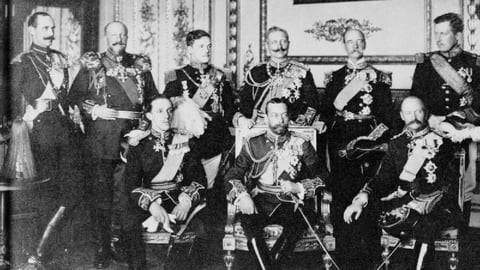World War I Lessons: The Danger of Greed
Greed helped to drive Europe—and the world—to war 100 years ago. What is it driving us to today? What does the Bible say about greed? (Part 3 in a series.)

What started World War I?
That question has been asked since 1914—the year the war started. Scholars and historians still debate over some of the causes of the war. Ironically enough, a key answer to this question was written almost 2,000 years before.
“Where do wars and fights come from among you? Do they not come from your desires for pleasure that war in your members? You lust and do not have. You murder and covet and cannot obtain. You fight and war. Yet you do not have because you do not ask” (James 4:1-2).
The start of the war is linked to the infamous killing of Austrian Archduke Franz Ferdinand by a member of a Serbian terrorist group. His death may have been a spark, but it wasn’t the cause of the war.
God, through James, tells us some underlying causes of war: lust, coveting and greed.
A time of empires
The early 20th century was a time of empires. Centered in Europe were the mighty Austrian, German, Russian, French and British empires, with the waning Ottoman Empire to the southeast.
With these empires constantly at odds over territory in Africa and power on the international scene, there was always a possibility of war.
As much as these massive empires had in their possession—thousands of square miles in Africa, portions of the Pacific Ocean and Asia, and influence throughout the Americas—it wasn’t enough. They wanted more territory and the economic wealth that could be derived from it.
But since all the earth’s land was already claimed by one empire or nation or another, expansion could only come through conflict and war.
Of course, it wasn’t just about gaining territorial supremacy for the sake of bringing in more raw materials—there was a sense of national pride that went along with the accumulation of territory.
This was especially the case for Kaiser Wilhelm II of Germany. He and other German elites desired Germany to attain Weltmacht (“world power”). This meant that Germany had to become more powerful than Great Britain—which ruled the largest empire the world had ever seen. Historians pinpoint this lust for world power as a driving force of World War I.
It’s easy to see why greed among nations and empires can be an awful thing—it can literally lead to the deaths of millions of people. But what about greed in the lives of ordinary people—you and me?
Greed
It’s easy to see why greed among nations and empires can be an awful thing—it can literally lead to the deaths of millions of people. But what about greed in the lives of ordinary people—you and me?
The Bible identifies greed as a serious spiritual problem with many negative consequences. Wise King Solomon wrote, “So are the ways of everyone who is greedy for gain; it takes away the life of its owners” (Proverbs 1:19).
In the case of empires, this has historically proven to be true. Out of the six empires that waged war against each other in 1914, only two survived the conflict. The Austrian, German and Ottoman Empires were dismantled at the end of the war, with the Russian Empire being overthrown slightly sooner.
Greed can also take over in our own lives. And greed is one aspect of a larger problem that plagues people and nations today.
The sin of covetousness
Many of us are familiar with the 10th Commandment: “You shall not covet” (Exodus 20:17).
Simply put, coveting is the desire for something that we don’t have, can’t have or shouldn’t have. Coveting is not limited to the desire for money—it can include a wide array of desires.
Coveting is described in the Bible as idolatry because it places our desires above God and His law (Colossians 3:5-7). Not only is coveting the exact opposite of God’s way of outgoing love toward others, but it often leads to other sins.
This is shown in a wide variety of examples from King David’s coveting Bathsheba (2 Samuel 11) to the secular examples displayed in movies and shows such as The Wolf of Wall Street and Breaking Bad. Though just entertainment, they display how sick and twisted coveting can make a person.
Coveting and greed were factors that ignited one of the most destructive wars in human history. Due to a desire for more wealth and power, nations did the unimaginable and the entire world suffered as a result.
What about you? Are you driven by love for others or by greed?
There is a real danger in greed and covetousness that we must be aware of. We need to learn from history and avoid this dangerous sin.
This is the third in a four part series on World War I Lessons. To read part 2, see “The Value of Human Life.” To continue the series, see part 4 “War is Hell.”
The opposite of being a greedy individual is to be driven by love—which is demonstrated through giving. Read our article about “Christian Giving” to learn more about developing this important characteristic in your life.
Date Posted: July 28, 2014



